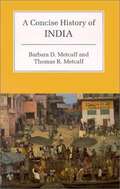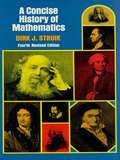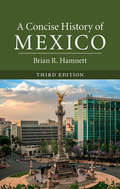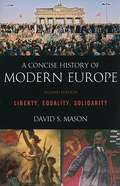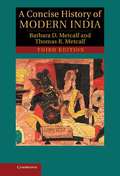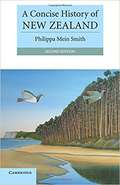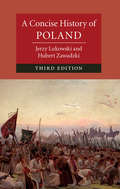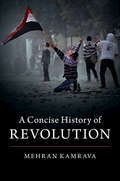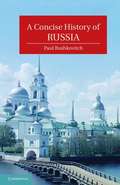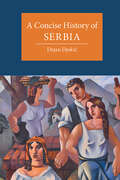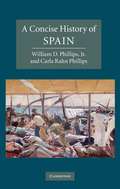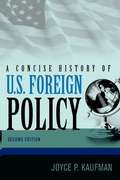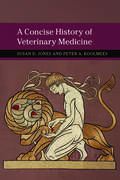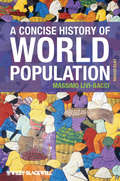- Table View
- List View
A Concise History of India
by Barbara D. Metcalf Thomas R. MetcalfA concise history of India since the time of the Mughals comprising the history of British India from the late eighteenth century until 1947, when the subcontinent was split into the two independent countries of India and Pakistan, and of the Republic of India thereafter.
A Concise History of Italy
by Christopher DugganSince its creation in 1861, Italy has struggled to develop an effective political system and a secure sense of national identity. This concise history, which covers the period from the fall of the Roman empire in the west to the present day, looks in particular at the difficulties Italy has faced during the last two centuries in forging a nation state. The opening chapters consider the geographical and cultural obstacles to unity, and survey the long centuries of political fragmentation in the peninsula since the sixth century. It was this legacy of fragmentation which Italy's new rulers had to strive to overcome when the country became united, more by accident than design, in 1859–61. The book aims to weave together political, economic, social and cultural history, and stresses in particular the alternation between materialist and idealist programmes for forging a nation state.
A Concise History of Japan
by Brett L. WalkerTo this day, Japan's modern ascendancy challenges many assumptions about world history, particularly theories regarding the rise of the west and why the modern world looks the way it does. In this engaging new history, Brett L. Walker tackles key themes regarding Japan's relationships with its minorities, state and economic development, and the uses of science and medicine. The book begins by tracing the country's early history through archaeological remains, before proceeding to explore life in the imperial court, the rise of the samurai, civil conflict, encounters with Europe, and the advent of modernity and empire. Integrating the pageantry of a unique nation's history with today's environmental concerns, Walker's vibrant and accessible new narrative then follows Japan's ascension from the ashes of World War II into the thriving nation of today. It is a history for our times, posing important questions regarding how we should situate a nation's history in an age of environmental and climatological uncertainties.
A Concise History of Mathematics: Fourth Revised Edition (Dover Books on Mathematics)
by Dirk J. StruikThis compact, well-written history -- first published in 1948, and now in its fourth revised edition -- describes the main trends in the development of all fields of mathematics from the first available records to the middle of the 20th century. Students, researchers, historians, specialists -- in short, everyone with an interest in mathematics -- will find it engrossing and stimulating.Beginning with the ancient Near East, the author traces the ideas and techniques developed in Egypt, Babylonia, China, and Arabia, looking into such manuscripts as the Egyptian Papyrus Rhind, the Ten Classics of China, and the Siddhantas of India. He considers Greek and Roman developments from their beginnings in Ionian rationalism to the fall of Constantinople; covers medieval European ideas and Renaissance trends; analyzes 17th- and 18th-century contributions; and offers an illuminating exposition of 19th century concepts. Every important figure in mathematical history is dealt with -- Euclid, Archimedes, Diophantus, Omar Khayyam, Boethius, Fermat, Pascal, Newton, Leibniz, Fourier, Gauss, Riemann, Cantor, and many others. For this latest edition, Dr. Struik has both revised and updated the existing text, and also added a new chapter on the mathematics of the first half of the 20th century. Concise coverage is given to set theory, the influence of relativity and quantum theory, tensor calculus, the Lebesgue integral, the calculus of variations, and other important ideas and concepts. The book concludes with the beginnings of the computer era and the seminal work of von Neumann, Turing, Wiener, and others."The author's ability as a first-class historian as well as an able mathematician has enabled him to produce a work which is unquestionably one of the best." -- Nature Magazine.
A Concise History of Mexico
by Brian R. HamnettMexico's fascinating complexities are difficult to approach. This illustrated Concise History begins with a brief examination of contemporary issues, while the book as a whole - ranging from the Olmecs to the present day - combines a chronological and thematic approach while highlighting long-term issues and controversies. Modern Mexico, founded after independence from Spain in 1821, was created out of a long and disparate historical inheritance which has constantly influenced its evolution. This book takes account of that past and pays attention to the pre-Columbian and Spanish colonial influence. Mexico's economic problems are given historical treatment together with political analysis and attention to social and cultural factors. The book's prime objective is accessibility to readers, including those interested in gaining a broad general knowledge of the country and those across the professions anxious to secure a rapid but secure understanding of a subject where there are few starting points.
A Concise History of Mexico (Cambridge Concise Histories)
by Brian R. HamnettThis concise history looks at Mexico from political, economic, and cultural perspectives, portraying Mexico's struggle to break out of the colonial past and assert its viability as a sovereign state in a competitive world. In this third edition, Hamnett adds new material on Mexico's regional and international roles as they have emerged in the twenty-first century, including membership of supra-national organizations (including and moving beyond NAFTA), the Mexican drug war between government officials and gangs, and the immigration and border crises within the United States. He also discusses Mexico's relationship to the outside world, particularly its efforts to broaden the range of political and commercial associations, especially with European countries, the rest of Latin America, and the Pacific Rim through trade agreements with supra-national organizations.
A Concise History of Modern Europe: Liberty, Equality, Solidarity
by David S. MasonHighlighting the key events, ideas, and individuals that have shaped modern Europe, this fresh and lively book provides a succinct history of the continent from the Enlightenment to the present. Drawing on the enduring theme of revolution, David S. Mason explores the causes and consequences of revolution: political, economic, and scientific; the development of human rights; and issues of European identity and integration. He deliberately avoids a detailed chronology of every country and time period by emphasizing the most crucial events in shaping contemporary Europe. Fourteen focused chapters address such topical issues as the Enlightenment; the French Revolution and Napoleon; the Industrial Revolution; the theories and impact of Marx and Darwin; the revolutions of 1848, 1917, and 1989; the unifications of Germany and Italy; European imperialism; the two World Wars; the Cold War and decolonization; and the evolution and expansion of the European Union. Any reader needing a broad overview of the sweep of European history since 1789 will find this book, published in a first edition under the title Revolutionary Europe, an engaging and cohesive narrative.
A Concise History of Modern India
by Barbara D. Metcalf Thomas R. MetcalfA Concise History of Modern India, by Barbara D. Metcalf and Thomas R. Metcalf, has become a classic in the field since it was first published in 2001. As a fresh interpretation of Indian history from the Mughals to the present, it has informed students across the world. In the third edition of the book, a final chapter charts the dramatic developments of the last twenty years, from 1990 through the Congress electoral victory of 2009, to the rise of the Indian high-tech industry in a country still troubled by poverty and political unrest. The narrative focuses on the fundamentally political theme of the imaginative and institutional structures that have successively sustained and transformed India, first under British colonial rule and then, after 1947, as an independent country. Woven into the larger political narrative is an account of India's social and economic development, and its rich cultural life. Throughout, the authors argue that despite a powerful historiographical tradition to the contrary, no enduring meaning can be given to categories such as 'caste', 'Hindu', 'Muslim', or even 'India'.
A Concise History of New Zealand
by Philippa Mein SmithNew Zealand was the last major landmass, other than Antarctica, to be settled by humans. The story of this rugged and dynamic land is beautifully narrated, from its origins in Gondwana some 80 million years ago to the twenty-first century. Philippa Mein Smith highlights the effects of the country's smallness and isolation, from its late settlement by Polynesian voyagers and colonisation by Europeans – and the exchanges that made these people Maori and Pakeha – to the dramatic struggles over land and recent efforts to manage global forces. A Concise History of New Zealand places New Zealand in its global and regional context. It unravels key moments – the signing of the Treaty of Waitangi, the Anzac landing at Gallipoli, the sinking of the Rainbow Warrior – showing their role as nation-building myths and connecting them with the less dramatic forces, economic and social, that have shaped contemporary New Zealand.
A Concise History of Poland (Cambridge Concise Histories Ser.)
by Jerzy Lukowski Hubert ZawadzkiPoland is a tenacious survivor-state: it was wiped off the map in 1795, resurrected after the First World War, apparently annihilated again in the Second, and reduced to satellite status of the Soviet Union after 1945. Yet it emerged in the vanguard of resistance to the USSR in the 1980s, albeit as a much more homogeneous entity than it had been in its multi-ethnic past. This book outlines Poland's turbulent and complex history, from its medieval Christian origins to the reassertion of that Christian and European heritage after forty-five years of communism. It describes Poland's transformation since 1989, and explains how Poland navigated its way into a new Commonwealth of Nations in the European Union. Recent years have witnessed significant changes within Poland, Eastern Europe and the wider world. This new edition reflects on these changes, and examines the current issues facing a Poland which some would accuse of being out of touch with 'European values'.
A Concise History of Poland: Second Edition
by Jerzy Lukowski Hubert ZawadzkiThe second edition of this guide to Poland has been updated to take account of the years from 1989-2005. This period marked its liberation from the Soviet Union, the birth of Poland's 'Third Republic' and, recently, its accession to the European Union in 2004. Poland's history has been marked by its resilience. Once a dominant force in central and eastern Europe and home to a remarkable experiment in consensual politics, it was excised from the map by its neighbours in 1795. Resurrected in 1918, partitioned afresh during the Second World War, it survived to become a satellite of the Soviet Union. Yet in the 1980s, it was Poland which blazed the trail in casting off communism, and was finally able to reassert its Christian heritage. With its updated bibliography and new chronology, the book is the ideal companion for all looking for a comprehensive survey of this fascinating country.
A Concise History of Portugal
by David BirminghamThis concise, illustrated history of Portugal presents an introduction to the people and culture of the country and its search for economic modernization, political stability and international partnership. The first single-volume account of Portugal's history since the days of dictatorship and colonization, this updated second edition also covers the state of historical writing on Portugal at the turn of the millennium. First Edition Hb (1993): 0-521-43308-8 First Edition Pb (1993): 0-521-43880-2 David Birmingham is a Professor of Modern History at the University of Kent, Canterbury. He has written extensively on Portugal and Africa including, among others, The Decolonization of Africa (UCL Press, 1995), History of Central Africa, Volume Three (Longman, 1998), and Portugal and Africa (Macmillan, 1999) and, more recently, a survey of Trade and Empire in the Atlantic, 1400-1600 (Routledge, 2000).
A Concise History of Portugal (Cambridge Concise Histories )
by David BirminghamThis concise, illustrated history of Portugal offers an introduction to the people and culture of the country, its empire, and its search for economic modernisation, political stability and international partnership. It remains the standard single-volume work on Portugal, studying the effects of the vast wealth mined from Portuguese Brazil, the growth of the wine trade, and the evolution of international ties. <P><P>The Portuguese Revolution of 1820 to 1851 created a liberal monarchy, but in 1910 the king was overthrown and, by 1926, had been replaced by a dictatorship. In 1975, Portugal withdrew from its African colonies and looked north to become a democratic member of the European Community in 1986. This third edition brings the story up to date, with a new afterword to reflect recent changes in Portugal, Europe, and the wider world.<P> A new edition of David Birmingham's classic account of Portuguese history from the early medieval period to the present day.<P> The book is already established as the most reliable and accessible single-volume history of modern Portugal in print.<P> Brings the story up-to-date by discussing the recent changes in Portugal, Europe, and the wider world.
A Concise History of Revolution
by Mehran KamravaPresenting a new framework for the study of revolutions, this innovative exploration of French, Russian, Chinese, Vietnamese, Cuban, Iranian, South African, and more recent Arab revolutions, provides a theoretically grounded and empirically comprehensive demonstration of how revolutions mean more than mere state collapse and rebuilding. Through the examination of multiple historical case studies, and use of extensive historical examples to explore a range of revolutions, Mehran Kamrava reveals the range and depth of human emotion and motivations that are so prevalent and consequential in revolutions, from personal commitment to sacrifice, determination, leadership ability, charisma, opportunism, and avarice.
A Concise History of Romania
by Keith HitchinsSpanning a period of 2000 years from the Roman conquest of Davia to the present day, A Concise History of Romania traces the development of a unique nation situated on the border between East and West. In this illuminating new history, Keith Hitchins explores Romania's struggle to find its place amidst two diverse societies: one governed by Eastern orthodox tradition, spirituality and agriculture and the other by Western rationalism, experimentation and capitalism. The book charts Romania's advancement through five significant phases of its history: medieval, early modern, modern and finally the nation's 'return to Europe'; evaluating all the while Romania's part in European politics, economic and social change, intellectual and cultural renewals and international entanglements. This is a fascinating history of an East European nation; one which sheds new light on the complex evolution of the Romanians and the identity they have successfully crafted from a unique synthesis of traditions.
A Concise History of Russia
by Paul BushkovitchAccessible to students, tourists and general readers alike, this book provides a broad overview of Russian history since the ninth century. Paul Bushkovitch emphasizes the enormous changes in the understanding of Russian history resulting from the end of the Soviet Union in 1991. Since then, new material has come to light on the history of the Soviet era, providing new conceptions of Russia's pre-revolutionary past. The book traces not only the political history of Russia, but also developments in its literature, art and science. Bushkovitch describes well-known cultural figures, such as Chekhov, Tolstoy and Mendeleev, in their institutional and historical contexts. Though the 1917 revolution, the resulting Soviet system and the Cold War were a crucial part of Russian and world history, Bushkovitch presents earlier developments as more than just a prelude to Bolshevik power.
A Concise History of Serbia (Cambridge Concise Histories)
by Dejan DjokićThis accessible and engaging book covers the full span of Serbia's history, from the sixth-century Slav migrations up to the present day. It traces key developments surrounding the medieval and modern polities associated with Serbs, revealing a fascinating history of entanglements and communication between southeastern and wider Europe, sometimes with global implications. This is a history of Serb states, institutions, and societies, which also gives voice to individual experiences in an attempt to understand how the events described impacted the people who lived through them. Although no real continuity between the pre-modern and modern periods exists, Dejan Djokić draws out several common themes, including: migrations; the Serbs' relations with neighbouring empires and peoples; Serbia as a society formed in the imperial borderlands; and the polycentricity of Serbia. The volume also highlights the surprising vitality of Serb identity, and how it has survived in different incarnations over the centuries through reinvention.
A Concise History of South Africa
by Robert RossThis book provides a succinct synthesis of South African history from the introduction of agriculture about 1500 years ago up to and including the government of Nelson Mandela. Stressing economic, social, cultural and environmental matters as well as political history, it shows how South Africa has become a single country. On the one hand it lays emphasis on the country's African heritage, and shows how this continues to influence social structures, ways of thought and ideas of governance. On the other, it chronicles the processes of colonial conquest and of economic development and unification stemming from the industrial revolution which began at the end of the nineteenth century. This leads on to a description and analysis of the fundamental political changes which South Africa is currently undergoing, while providing a background for the understanding of those many things which have not changed.
A Concise History of Spain
by Carla Rahn Phillips William D. Phillips JrThe rich cultural and political life of Spain has emerged from its complex history, from the diversity of its peoples, and from continual contact with outside influences. This book traces that history from prehistoric times to the present, focusing particularly on culture, society, politics, and personalities. Written in an engaging style, it introduces readers to the key themes that have shaped Spain's history and culture. These include its varied landscapes and climates; the impact of waves of diverse human migrations; the importance of its location as a bridge between the Atlantic and the Mediterranean and Europe and Africa; and religion, particularly militant Catholic Christianity and its centuries of conflict with Islam and Protestantism, as well as debates over the place of the Church in modern Spain. Illustrations, maps, and a guide to further reading, major cultural figures, and places to see, make the history of this fascinating country come alive.
A Concise History of Sweden
by Neil KentNeil Kent's book sweeps through Sweden's history from the Stone Age to the present day. Early coverage includes Viking hegemony, the Scandinavian Union, the Reformation and Sweden's political zenith as Europe's greatest superpower in the seventeenth century, while later chapters explore the Swedish Enlightenment, royal absolutism, the commitment to military neutrality and Pan-Scandinavianism. The author brings his account up to date by focusing on more recent developments: the rise of Social Democracy, the establishment of the welfare state, the country's acceptance of membership in the European Union and its progressive ecological programme. The book successfully combines the politics, economics and social and cultural mores of one of the world's most successfully functioning and humane societies. This is an informative and entertaining account for students and general readers.
A Concise History of Switzerland
by Clive H. Church Randolph C. HeadDespite its position at the heart of Europe and its quintessentially European nature, Switzerland's history is often overlooked within the English-speaking world. This comprehensive and engaging history of Switzerland traces the historical and cultural development of this fascinating but neglected European country from the end of the Dark Ages up to the present. The authors focus on the initial Confederacy of the Middle Ages; the religious divisions which threatened it after 1500 and its surprising survival amongst Europe's monarchies; the turmoil following the French Revolution and conquest, which continued until the Federal Constitution of 1848; the testing of the Swiss nation through the late nineteenth century and then two World Wars and the Depression of the 1930s; and the unparalleled economic and social growth and political success of the post-war era. The book concludes with a discussion of the contemporary challenges, often shared with neighbours, that shape the country today.
A Concise History of U.S. Foreign Policy
by Joyce P. KaufmanA Concise History of U. S. Foreign Policy offers a conceptual and historical overview of American foreign relations from the founding to the present. Joyce Kaufman clearly explains major themes in foreign relations and places the evolution of policy decisions within the context of the international situations and domestic priorities.
A Concise History of Veterinary Medicine (New Approaches to the History of Science and Medicine)
by Susan D. Jones Peter A. KoolmeesFrom Ayurvedic texts to botanical medicines to genomics, ideas and expertise about veterinary healing have circulated between cultures through travel, trade, and conflict. In this broad-ranging and accessible study spanning 400 years of history, Susan D. Jones and Peter A. Koolmees present the first global history of veterinary medicine and animal healing. Drawing on inter-disciplinary and multi-disciplinary perspectives, this book addresses how attitudes toward animals, disease causation theories, wars, problems of food insecurity and the professionalization and spread of European veterinary education have shaped new domains for animal healing, such as preventive medicine in intensive animal agriculture and the need for veterinarians specializing in zoo animals, wildlife, and pets. It concludes by considering the politicization of animal protection, changes in the global veterinary workforce, and concerns about disease and climate change. As mediators between humans and animals, veterinarians and other animal healers have both shaped, and been shaped by, the social, cultural, and economic roles of animals over time.
A Concise History of Wales
by Geraint H. JenkinsBased on the most recent historical research and current debates about Wales and Welshness, this volume offers the most up-to-date, authoritative and accessible account of the period from Neanderthal times to the opening of the Senedd, the new home of the National Assembly for Wales, in 2006. Within a remarkably brief and stimulating compass, Geraint H. Jenkins explores the emergence of Wales as a nation, its changing identities and values, and the transformations its people experienced and survived throughout the centuries. In the face of seemingly overwhelming odds, the Welsh never reconciled themselves to political, social and cultural subordination, and developed ingenious ways of maintaining a distinctive sense of their otherness. The book ends with the coming of political devolution and the emergence of a greater measure of cultural pluralism. Professor Jenkins's lavishly illustrated volume provides enthralling material for scholars, students, general readers, and travellers to Wales.
A Concise History of World Population
by Massimo Livi BacciThis fifth edition of the essential history of world population is updated with the most recent and significant scholarship on the topic. Reworked sections analyze the impact of environmental and climate change, discuss declining fertility in developing nations, and track the continuing impact of HIV-AIDS. Central themes updated and revised to take account of new scholarship Includes new sections on theories of migration in pre-history Expands discussion of low fertility rates in developing Asian and Latin American countries Fuller coverage of population and environmental change, including the effects of climate change Bibliographic updates include weblinks to key scientific journals
